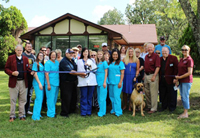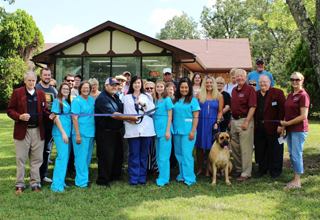In legal case, private practitioner held responsible for portion of $5 million jury award

Ribbon cutting 320

Photo courtesy of the Rolla Area Chamber of Commerce
Dr. Jessica Wodohodsky recently opened South Side Animal Clinic in Rolla, Missouri. She is pictured holding oversized scissors alongside her husband and co-owner, Jason Wodohodsky.
Dr. Jessica Wodohodsky can't write or type without causing muscle spasms in her right hand. Medication and Botox injections help ease burning pain that otherwise migrates up her arm and beyond. An implant that delivers electrical pulses to her spinal cord also provides some relief, as does a cane, which she uses to walk when she's not embarrassed to be seen with it.
Wodohodsky is relying on a $5 million court verdict to help pay for the medical care she's needed since her final year of veterinary school at the University of Missouri in 2009, when her dominant hand was crushed by an unrestrained calf as she was giving vaccinations at a commercial cattle operation. Now age 41, she's been diagnosed with complex regional pain syndrome and thoracic outlet syndrome, both chronic nerve conditions that can worsen with time.
On the face, Wodohodsky v. Hall, Hall and Gourley appears to be a run-of-the-mill personal injury case involving negligence. Its findings, however, could have philosophical and legal implications for how veterinary academia outsources the clinical education of students to private practitioners who provide real-world training and, as a result, might be exposed to legal risk.
Dr. David Gourley, a private practitioner and approved mentor with the university's veterinary college; and Jerry and David Hall, producers with whom Gourley works, were found in 2017 to be largely responsible for Wodohodsky's injury. She asserted that Gourley failed to provide proper supervision when a farm manager ordered her to vaccinate multiple calves in a single squeeze chute on the Hall property.
Trying to work with jostling 500-pound animals, Wodohodsky testified that as she attempted to vaccinate one calf, her hand was crushed against the chute by another.
Gourley, off-site at the time Wodohodsky was injured, was assessed $1.2 million of the $5 million award; the Halls, $3 million. But Wodohodsky, too, had some culpability, the jury found, for failing to leave what she characterized in court to be a "chaotic" situation. She was held accountable for the remaining $800,000.
Gourley's attorneys appealed, to no avail. A Missouri appeals court affirmed the verdict in May. A month later, the Missouri Supreme Court declined the case, and the judgment was paid.
"My life has completely changed since the injury 10 years ago," Wodohodsky said recently by email. Suggesting that the award was no financial windfall, she added, "By the way, I still owe around $160,000 in student loans."
Call for attention from profession
Contacted by VIN News, Gourley would not share his thoughts publicly on the case. Wodohodsky's account of the incident and what followed is recorded in court transcripts of the 2017 trial. Asked by attorneys why she didn't speak up or refuse to work under unsafe conditions, she testified: "I was the only girl on the farm. … I didn't have Dr. Gourley's phone number. I had no phone. I don't know the Halls."
She continued to work after the injury, using her left hand: "I had to get my grade. I was a student working. It's not like I had a choice. I did all of that four years of work. I wasn't just going to lay down. I had to complete the task."
If a student feels too intimidated to speak up, that's a problem worth addressing, said Dr. Fred Gingrich, executive director of the American Association of Bovine Practitioners. So is the fact that the profession did not foresee this type of litigation coming, he said.
During a meeting of American Veterinary Medical Association leadership last month in Chicago, Gingrich called on the organization to develop best practices for the safety of students and the veterinarians who mentor them.
"We all have risks," he said during an address to the House of Delegates, an AVMA policymaking body. "Safety and risk mitigation … are important for the AVMA to identify. What if a student gets injured? Do we fill out an injury report, or do a drug and alcohol test?"
An educational system that relies on a network of private practitioners to teach veterinary students in their practices must do more to protect those involved, Gingrich said. Without more support, he warned, practitioners will stop taking students in their practices, and so will producers.
"I think we have to pause and say, we're laying all the responsibility on veterinarians here," he said. "… We take students, out of the goodness of our hearts. We buy them ice cream and sandwiches and lunch, and then we have to worry about being sued by them."
Attorney: Sky isn't falling
Wodohodsky's attorney, Chandler Gregg, said the case shouldn't be interpreted as open season on veterinarians who mentor students. The only ones at risk, Gregg said, are those found to be negligent if the student is injured on the job.
"Any reasonable veterinarian who's been approved to supervise students will not have problems with this," he said by phone. "A person does not automatically get compensated when she's hurt. A student would have to prove that the veterinarian was acting in a manner that an ordinarily skilled veterinarian would not act, and that this failure by the veterinarian to act reasonably caused the student's injury."
He added, "This is what Jessica proved against Dr. Gourley and is what any other injured student would have to prove in order to receive anything."
Wodohodsky's assignment at the Hall cattle farm began in April 2009, when David Hall called Gourley to ask whether he had any students available to help vaccinate cattle, according to court records. At the time, Gourley had no students working at the clinic so he contacted the university veterinary college. Wodohosky, who'd grown up vaccinating cattle on her family's farm in North Carolina, volunteered for the work, as did another fourth-year student.
Gourley accompanied the students to the Hall farm on the first day, supervising with cattle processing, including vaccinations and pregnancy checks. On that day, only one calf was allowed in the cattle chute at a time, and each one was properly restrained.
The next day, Gourley gave the two students a cooler of vaccines to be used at a second farm owned by the Halls. Wodohodsky had thought he would meet them at the farm, but he did not arrive until some time later. Initially, the day's activities were overseen by a ranch manager who is not a veterinarian and not authorized to supervise veterinary students.
A narrative of the facts given in the appellate court decision reads:
"Upon arriving at the Halls' second farm, Wodohodsky observed that the scene was loud and chaotic — the bulls, heifers and calves were not separated. ... Wodohodsky was concerned for her safety. She requested that the process be done the same way as the day before — with only one calf at a time restrained in the chute. [Jeff] Gall [the ranch manager] became angry, fearing that this would slow down the process. Wodohodsky's concern was dismissed, and the following procedure was used instead: two calves were 'crammed' in the chute, with the first calf restrained in the head catch, and the second calf unrestrained with no squeeze applied.
"As Wodohodsky went to vaccinate the calf restrained in the head catch, the unrestrained calf jumped up and crushed her hand against the chute. After a short rest, Wodohodsky resumed her duties. Dr. Gourley later arrived at the farm, and Wodohodsky assisted him with pregnancy checks."
Wodohodsky sought medical treatment for her hand "within a few days," the document states.
Gregg, Wodhodsky's lawyer, told VIN News that Gourley's mistake was not being present to provide supervision.
"This is the same kind of thing you could bring against any professional or any person," he said. "You can't create an unreasonably unsafe situation for someone else. A jury has to find negligence, and they have to find that the conduct caused the injury in question.
"Can people get hurt on a farm? Of course," he continued. "But that's not all that happened in this instance. Here, the supervising veterinarian failed to supervise at all, and as a consequence, the process was unsafe and Jessica was hurt."
Media contacts at the University of Missouri's veterinary college did not respond to a VIN News query about whether the program requires its private-practitioner mentors to provide direct supervision of students. However, Dr. Loren Schultz, an associate teaching professor of veterinary medicine and surgery, was deposed in the case. According to his testimony, the level of supervision required depends upon the duties to be performed by students.
By phone, Schultz reiterated that the required supervision level varies, depending on the job.
Asked about the supervision required to administer vaccines, Schultz said, "If you're giving regular vaccines, no, supervision isn't needed." After all, he said, one need not be a veterinarian to give a vaccination: "Any producer can just go to a feed store, buy them and administer them."
The University of Missouri was not a defendant in the case. By state law, public entities are immune from civil suits.
Advice from PLIT
In response to the lawsuit, the Professional Liability and Insurance Trust — an arm of the AVMA that offers liability coverage and other programs to members — recently issued a guide for veterinarians who open their practices to students and volunteers. PLIT officials recommend that veterinarians annually review their insurance coverage to make sure they're adequately protected in case a student or volunteer is injured on the job.
They explained that if a student or volunteer travels to a third-party premise, such as a client's farm and is injured, the veterinary practice's worker's compensation policy would provide primary coverage, so long as the policy covers volunteers. However, insurance coverage cannot prevent someone from filing a personal injury claim.
The PLIT suggests that veterinarians who mentor students or enlist volunteers:
- Consult an attorney to develop a statement of indemnification that outlines who's responsible in the event of an injury.
- Require each student or volunteer to provide documentation of medical insurance.
- Establish practice policies and procedures that enable students and volunteers to get the training they need and encourage them to stop working and notify a supervising veterinarian if they're uncomfortable with a task.
- Review safety practices around animals for tasks that students and volunteers are assigned.
- Keep the lines of communication open with students and volunteers.